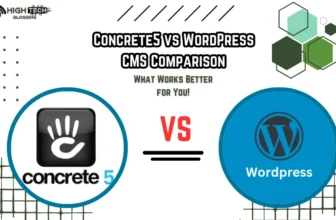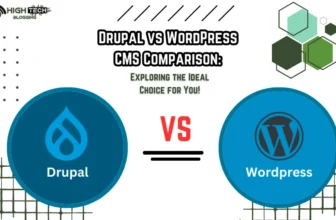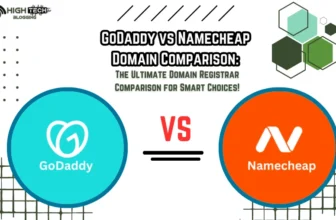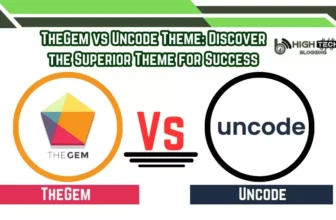Choosing a content management system (CMS) is an important decision that can have a big impact on your website. There are quite a few systems out there, each with its own advantages and disadvantages and a fanatical fan base that advocates for their chosen platform. Nevertheless, there are two platforms that stand out from the crowd and can be directly compared: WordPress and Joomla.
Both platforms are known for their ease of use, extensive customization options, and active community. While WordPress and Joomla have their respective advantages and disadvantages, they can both be used to create modern, feature-rich websites – so how should you decide which one is right for you? 🤔
WordPress vs Joomla: But don’t worry! We’ll help you out by comparing both platforms in four exciting rounds (maybe we’re exaggerating a bit here) to find out which one has the upper hand. Without further ado, let’s start with WordPress vs. Joomla!
Table of Contents
WordPress vs Joomla: a 4-Round Comparison

👉 For example, the usual way to create a website with WordPress is as follows:
(You can find a detailed guide on how to create a website with WordPress here).
With Joomla, on the other hand, you won’t have your hands free as easily. The hosts that allow Joomla usually don’t have custom installation processes, which means you’ll have to do most things yourself.
Still not sure which is better for you: WordPress or Joomla? Here’s a detailed comparison:
1. Search Engine Optimization ⚙️
If we compare the search engine optimization (SEO) capabilities of both platforms, Joomla has a slight edge, as it allows its users to set meta descriptions and keywords for new articles, like here:
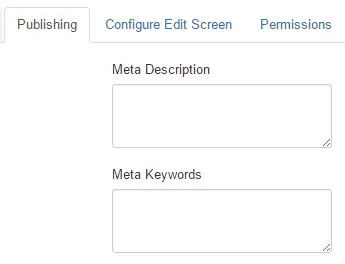
However, the true SEO capabilities of the two platforms are not readily apparent unless you take a look at the plugins or extensions available for the task. On the WordPress side, we have the incredibly popular Yoast SEO plugin – it’s powerful, offers many features, and the best part is that anyone can get up and running with it within minutes.

Yoast categorizes your SEO score in different areas using a traffic light system with red, yellow or green colors. Besides, the plugin tells you exactly how to improve your score in each area – and if that wasn’t enough, it also evaluates the readability of your post.
During our testing, we found Easy Frontend SEO (EFSEO) to be the best Joomla equivalent to Yoast. It allows you to perform many of the same tasks – such as editing your meta information – directly in the frontend of your site, and also includes a handy automatic mode to generate this data without your input.

However, it is clear that EFSEO, as practical as it is, cannot compete with Yoast. For this reason, the first round of WordPress vs Joomla goes to WordPress.
2. Security 🔒️
When it comes to security, any system is only as strong as its weakest link – so the question is: which platform is inherently more secure?
Because of its popularity, WordPress has a huge target on its back when it comes to security vulnerabilities. Each WordPress installation is unique, thanks to the thousands of plugins (there’s a plugin for everything from creating charts to using Pig Latin) and themes available for the CMS.

While this is definitely positive, it’s a nightmare from a security standpoint – it’s impossible to ensure that every plugin applies the proper security standards and remains compatible with newer versions of the platform.
Moreover, WordPress doesn’t have basic features like forcing a Secure Socket Layer (SSL) connection on the dashboard – you need to change the core files to enable it – or two-factor authentication (2FA). In fact, most of the advanced security features are completely dependent on plugins.
On the other hand, Joomla offers both an option to force connections over SSL and another one for 2FA. Moreover, it offers its own set of security extensions, and its developers maintain a list of extensions with known security vulnerabilities.

Round two of WordPress vs Joomla goes to Joomla.
3. Customization Potential 🎨
We’ve already found out quite a bit about WordPress plugins and Joomla extensions. Both CMSs have their own list of plugins for most use cases imaginable – although WordPress comes out on top due to sheer numbers.
However, when we look at the top plugins for each CMS, we feel that WordPress‘ offering subjectively has more “shine”. You don’t have to take our word for it – a simple comparison of two tools we mentioned earlier, Yoast SEO and EFSEO (in that order), shows this:

While the latter offers just as many features as its WordPress counterpart, the former offers a better experience overall.
When it comes to customizing the style of your website, WordPress themes are on one side and Joomla templates on the other, and the same is true here as with plugins. Not only is it easier to find quality WordPress themes, but they often offer a higher level of support and a better experience most of the time.
Round three goes to WordPress.
4. Content Management & Potential 🧑💻

Both WordPress and Joomla are complex CMSs that allow users to create and manage almost any type of website. Although WordPress is often associated with simple blogs, it is also a great solution for landing pages and even more complex websites.
On the other hand, Joomla is known for its complexity – although it offers fantastic documentation. A website built with Joomla can evolve into anything it wants, but the learning curve is much steeper for users with no web development experience.
Although it is equal in terms of sheer potential, it is fair to say that WordPress allows its users to manage their content with relative ease. Anyone can install the platform and learn how to create posts, pages or custom post types within minutes, while Joomla is less forgiving.
Considering all this, we have to award the final round of the WordPress vs. Joomla contest to the former, giving WordPress the overall victory!
FAQ’s
Which CMS, WordPress or Joomla, is better for a beginner?
As a beginner, I would recommend WordPress. It has a user-friendly interface, intuitive navigation, and a large user community that offers extensive support and resources. Joomla, while very powerful, can have a steeper learning curve for beginners.
How do WordPress and Joomla compare in terms of customization options?
Both WordPress and Joomla offer extensive customization options. However, WordPress is known for its extensive collection of themes and plugins that make it easier to change the look and functionality of your website. Joomla, on the other hand, offers more flexibility for advanced customization and complex websites.
Which CMS offers more flexibility for adding new features and functionality?
In my experience, WordPress offers more flexibility in adding new features and functionality. Its plugin ecosystem is unparalleled, with thousands of free and premium plugins available for almost every feature imaginable. There is also a wide range of extensions for Joomla, but the choice is perhaps not as wide as for WordPress.
What are the key differences in terms of SEO capabilities between WordPress and Joomla?
Both WordPress and Joomla have built-in SEO features and can be optimized for search engines. However, WordPress has a slight advantage due to its SEO-friendly structure, customizable permalinks, and the availability of popular SEO plugins like Yoast SEO. Joomla requires additional extensions for advanced SEO features.
Can I migrate my website from Joomla to WordPress, or vice versa?
Yes, it is possible to migrate your website from Joomla to WordPress or vice versa. However, the process can be complex and may require expert assistance or special migration tools to ensure a smooth transition.
Conclusion
In some ways, Joomla is more flexible than WordPress. It offers an incredibly customizable system that can take almost any shape you want, and it allows you to make many small adjustments without relying on extensions.
Between WordPress and Joomla, however, there can only be one winner, and the crown has to go to WordPress.
It beats Joomla when it comes to SEO, customization options and content management – so the choice is clear. In addition, WordPress is simply easier for new users to learn, and its popularity gives it the added advantage of offering users a better support structure – that’s the cherry on top of WordPress’ icing.
Again, if you want to learn step-by-step how to build a website with WordPress at 👨🎓, you can find our guide here.
If you are looking for 🔎 an affordable WordPress host with easy startup features, you should check out Bluehost. Bluehost will take care of the WordPress installation for you and make it easy for you to get started with the platform after installation.
- User-Friendly Interface: WordPress offers a beginner-friendly interface, making it easy to create and manage websites without prior technical knowledge.
- Vast Plugin Ecosystem: WordPress has a vast collection of plugins, providing extensive functionality and customization options for your website.
- SEO-Friendly Structure: WordPress is inherently optimized for search engines, with features like customizable permalinks and SEO plugins to improve website visibility.
- Strong Community and Extensions: Joomla has an active community and a wide range of extensions, providing additional features and functionalities.
- Scalability: Joomla is known for its scalability, allowing websites to handle high volumes of traffic and content without significant performance issues.
- Learning Curve for Complex Customizations: Advanced customizations in WordPress may require some technical knowledge or coding skills.
- Website Performance: Heavily customized WordPress websites with numerous plugins can sometimes experience slower loading times and performance issues.
- Lack of User-Friendly Interface: Joomla’s interface can be less intuitive for beginners, potentially making it more challenging to navigate and manage websites.
- SEO Optimization Requires Additional Effort: Joomla requires additional extensions and manual optimization to achieve the same level of SEO-friendliness as WordPress.
- Limited Theme Selection: Joomla may have a more limited selection of professionally designed themes compared to WordPress.
Alan Brock is an entrepreneurship-focused tech blogger with a track record of founding several startups and involvement in the tech startup scene for many years. Eric’s blog delves into startup funding, team building, and product development. He provides a critical perspective on the challenges and opportunities that come with starting a business, as well as the latest trends in the startup world. Alan’s experience as a startup founder has made him a go-to source for anyone looking to launch their own tech startup.
To read more similar articles, click here.
Thanks for visiting our Website. If you appreciate our work, kindly show us some support in our comments section. 🙂


